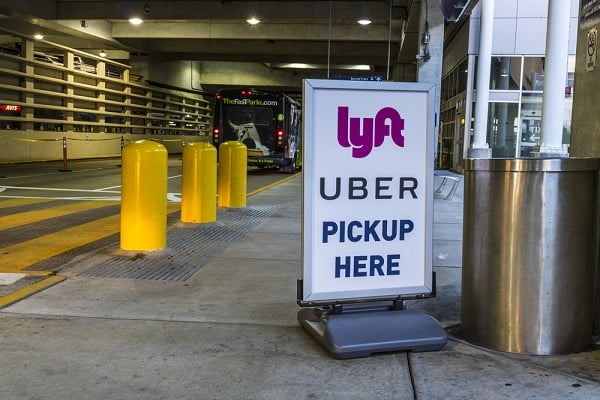 The act would also require rideshare and delivery network companies to offer new protections and benefits, including insurance to cover on-the-job injuries and health care subsidies for qualifying drivers. (Photo: Shutterstock)
The act would also require rideshare and delivery network companies to offer new protections and benefits, including insurance to cover on-the-job injuries and health care subsidies for qualifying drivers. (Photo: Shutterstock)
In response to a recently enacted California law requiring certain gig workers to be classified as employees and not independent contractors, a coalition led by Uber, Lyft and DoorDash have announced a November 2020 state ballot measure to counteract the new law—as well as add new protections and benefits to workers.
The Protect App-Based Drivers & Services Act, if approved by voters, would allow drivers with rideshare and delivery network companies to be classified as independent contractors, enabling them "the flexibility to set their own hours for when, where and how they work."
Related: What does California's new gig rule mean for health insurance coverage?
"Recent legislation" AB-5 "has threatened to take away the flexible work opportunities of hundreds of thousands of Californians, potentially forcing them into set shifts and mandatory hours, taking away their ability to make their own decisions about the jobs they take and the hours they work," the measure states.
The act would also require rideshare and delivery network companies to offer new protections and benefits for their drivers, including minimum compensation levels of at least 120 percent of minimum wage, insurance to cover on-the-job injuries, automobile accident insurance, health care subsidies for qualifying drivers, protection against harassment and discrimination, and mandatory contractual rights and appeal processes.
"This ballot measure is going to be a win-win," Jermaine Brown, a Sacramento rideshare driver who works with both Uber and Lyft, says in the press release announcing the measure.
"Not only do drivers get to keep our flexible schedules, but we also get new benefits like healthcare and more earnings potential," Brown says. "I'm a stay at home dad. I do things with my kids during the day and drive in the evening. Being able to have that flexibility and being able to drive how I want to drive really helps me and my family."
Other app-based drivers told TechCrunch they support being classified as employees per the new California law, based on the passage of Assembly Bill No. 5 (Lorena Gonzalez – D, San Diego.)
"This is yet another example of corporations and billionaires trying to exempt themselves from the democratic process by using wealth and fear tactics," Edan Alva, a driver and organizer of the group, Gig Workers Rising, says in a statement emailed to TechCrunch.
"For years, these companies have refused to pay drivers fairly or treat us with respect," Alva says. "After working 80 hour weeks, sleeping in our cars and surviving on poverty wages, drivers organized and won support for AB-5 from both the public and lawmakers."
However, other workers only work as drivers to supplement their income from their main jobs and prefer to be classified as independent contractors, according to the measure's press release.
"I'm a real estate broker and drive with DoorDash because I can fit it in my schedule and supplement my income," says Issy Tindimwebwa, a DoorDash driver from Los Angeles. "When I have free time, or when I have something I need to raise money for quickly, I just go to my app and off I go. If I were an employee, I would not get that. This ballot measure would be great for me because it would enhance my ability to make more money, while at the same time allowing me the flexibility to do what I want any time I want."
"I work eight hours a day at a homeless shelter as a cook and I do rideshare on my way to work and on my way home," says Lorraine Hanks, a Lyft driver who lives in San Francisco. "If I were an employee, I wouldn't get the same flexibility and would probably have to quit driving. San Francisco is so expensive to live that I need the extra money. Without my rideshare job and the extra income, I'd be a paycheck away from homeless."
The ballot measure also calls for new customer and public safety protections. The act, if passed, would provide for recurring background checks of drivers, mandatory safety training of drivers, zero tolerance for alcohol and drug offenses and a cap on driver hours per day to prevent sleepy driving.
Read more:
© Touchpoint Markets, All Rights Reserved. Request academic re-use from www.copyright.com. All other uses, submit a request to [email protected]. For more inforrmation visit Asset & Logo Licensing.







